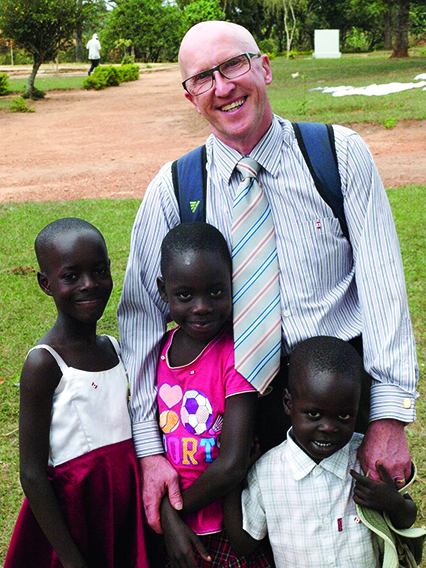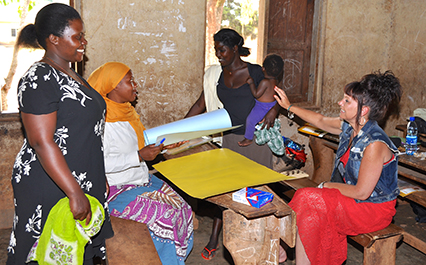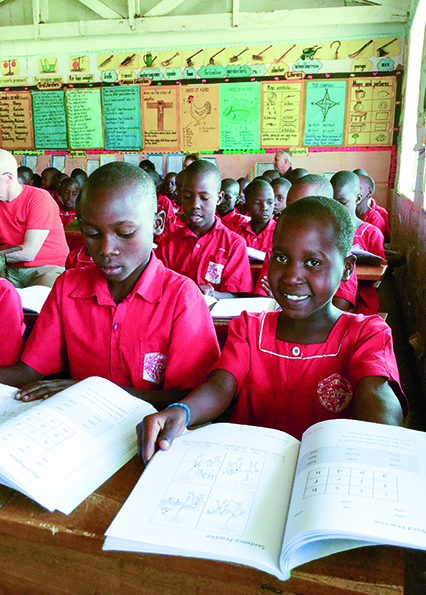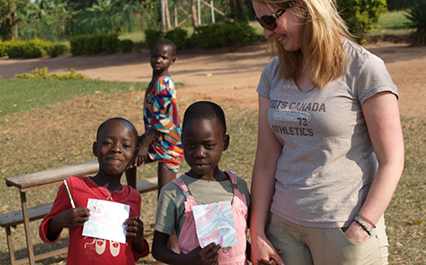Page Content
Masulita, Uganda | Educators make change through professional development program.
|
The Masulita, Uganda Professional Development Project is a joint endeavour operated in partnership with the Alberta Teachers’ Association. For three weeks each summer, Alberta teachers coteach with Ugandan educators in a government primary/secondary school in the town of Masulita or within a street project called Masulita Children’s Village.
Applications are being accepted for 2017.
Deadline is Dec. 1
Click here to view more information.
|
A project like no other
Martyn Chapman

On his way to a community function, project director Martyn Chapman poses for a photo with the children of the nurse from Masulita Children’s Village.
I enjoyed representing the Alberta Teachers’ Association and being part of a group of individuals who came together as strangers but grew into a close group of friends. Our host organizations were the Uganda Women’s Effort to Save Orphans (UWESO) and the Uganda National Teachers’ Union (UNATU). After the initial meetings, we visited the primary school with the best results in the country. The school, called BUDO, was certainly different from the schools we were to experience in Masulita.
This was a community development project in a small village. Our accommodations were in a compound shared with several staff and more than 100 street children. After reporting to the local authorities and the schools, we hosted early literacy/numeracy workshops for all local teachers of primary 1 to 3 classes — 43 teachers attended. UNATU organized the logistics and arranged the excellent facilitators.
We spent the next two weeks in government schools teaching alongside a Ugandan colleague. We switched schools for the second week so that all four of the village schools were impacted. Classes were sometimes very large and there were almost no resources.
Being completely immersed in the local culture, walking everywhere and using the shops, we were quickly accepted into village life. People expressed their appreciation by saying things like “Thank you for not being scared of us” and “Thank you for asking what we needed.” The people impacted by the project want it to continue and perhaps be expanded to include more teachers and different levels.
This is a project like no other, off the beaten path and in a community that rarely sees visitors or aid workers. The hospitality and care we received, together with the vibrancy of the people, left a deep and lasting impression. This was a wonderful experience for which I, and the people of Masulita, express heartfelt thanks to the ATA. ❚
Martyn Chapman is a retired teacher who co-founded the Masulita, Uganda project and has acted as project director until this year.
Professional development project changes lives
Jodi Rosvold
 .
.
Jodi Rosvold caresses the baby of a Ugandan teacher at a workshop hosted by Alberta teachers for members of the Uganda National Teachers’ Union (UNATU). It’s common for Ugandan women to bring their babies to such events.
During the month of July 2016, I had the privilege and honour of representing the Alberta Teachers’ Association for the Masulita project in Uganda. I went, I believed, well prepared, but I soon discovered I was not.
Someone once said that Africa will change you, but I truly didn’t understand the profound impact it would have on me. In one short month, I completely fell in love with the culture, the people and the surroundings. The things I thought would be so difficult, such as teaching without resources, not having luxuries such as showers and reliable electricity, or being stripped of other modern comforts, really became insignificant. In retrospect, it was refreshing, in a sense, to experience staying in a third world nation where, despite enormous challenges, hardships and, sometimes, social injustices, the people remain joyous, optimistic and grateful. Their courage and resilience are inspiring.

Alberta teacher Jodi Rosvold holds the hand of a street child.
The experience I gained as a teacher was enormous. Not only do I have a new appreciation for the resources I have access to, like computers, books, electricity, chalk, a chalk brush — or a toilet with a seat — but I also have a new appreciation for our relatively small class sizes and our unlimited access to professional development opportunities.
Teachers there could never comprehend how fortunate we are because it is so beyond their realm of thought or expectations. For many, the PD we provided was the only PD they’ll get, and their appreciation was evident.
I would like to express my heartfelt appreciation to the ATA for taking on this project and for providing such an enriching experience to teachers within Alberta. And thank you for remembering a people, country and culture that largely go ignored. In doing so, you’ve changed so many lives ... mine being one of them. ❚
Jodi Rosvold teaches Grade 6 at Elm Street School in Medicine Hat and is taking over as Masulita, Uganda project director.
Unique experience provides tremendous honour
Katherine Cook

As part of the three-week Masulita, Uganda project, Alberta teachers tour a variety of Ugandan schools, including this high-performing school in Kampala. The tour is organized by the Uganda National Teachers’ Union.
Travelling and collaborating with the skilled group of professionals who composed the Masulita team has forever changed my personal teaching practice. Sharing experiences and lesson plans, reflecting and having conversations at the end of sometimes challenging days all contributed to a strong team dynamic, and also to a new insight into different perspectives.
One such example was a conversation after a lesson that I taught for an English class. Having observed the teacher, I decided that perhaps I could build on what he taught by introducing a collaborative assignment and have the class write letters on the blackboard, then circle and identify all of the proper nouns we used in the process.
Well, the students were completely confused — it was such a deviation from the daily structure. The students were not able to benefit from a new activity. I returned to our house at the end of the day feeling like an utter failure.
However, after discussing the lesson, and closely examining the daily teaching routine that the classroom teacher uses, a new way of looking at the circumstance emerged. I could see that just because the classroom teacher was using strategies different from what we use in Canada, it didn’t mean that they were not effective. Rather than jumping in and trying to change things to “our way,” perhaps I could try teaching in a similar way to how the classroom teacher did. Well, I did just that, and success!
I was able to provide additional written feedback to students, and help with some different strategies in one-on-one situations, but for the larger class, the principle “if it isn’t broken, don’t fix it” seemed a good idea for a short-term teaching assignment.
I have been fortunate to have many travel experiences to expand my views of the world, but the trip to Masulita was unique. By living with local people, staying in rural communities and working with local teachers and teachers’ organizations, I formed a new picture of the challenges facing less fortunate nations. The more we saw, learned and heard from local people, the more complex the issues became.
Coming home and trying to process what we have learned and experienced has been a difficult process. Likewise, trying to find a way to continue to help the people in Uganda and share the experience with others is a balancing act that I look forward to sharing with my team.
Personally, I have returned to my classroom with a new outlook. I am eager to share some of the experiences with my class, and my students have loved looking at the pictures of “my class” in Uganda. I will be infusing my experiences into my practice when parallels can be made, and the students will benefit. I am eager to share a brief overview at our first local council meeting, and am excited to encourage our local teachers to apply to be part of this amazing experience.
This project provided challenges and rewards that (I feel) can never be duplicated. The respect that the teachers and people in Uganda have for the teaching profession, and the gratitude they have expressed to the ATA for the support, has added another dimension to my role as a teacher. Teaching is a profession where you truly can make a difference, and to be able to collaborate and teach with teachers in another country was a tremendous honour. ❚
Katherine Cook teaches Grade 2 at C. W. Sears Elementary School, in Tofield.
Appreciation for ‘little things’ one of many takeaways from Africa adventure
Stephen Wiewel

Children from Masulita Children’s Village display the pictures they coloured while working with Alberta teachers who participated in the Masulita, Uganda program. Project participants often coloured with all 115 of the children. Pictured with the children is Alberta teacher Katherine Cook.
As I enter my 35th and final year of teaching, the opportunity to teach in Uganda with the Masulita Project will stand out as one of my greatest teaching memories. In applying for the project, I indicated that being a part of it would allow me one more opportunity to give back to the profession that has given me so much.
To represent the Alberta Teachers’ Association was truly a privilege. I will be forever grateful to the Association for being entrusted with such a great responsibility. If it were possible I would suggest that every teacher needs to go on such a trip. I have always been aware of the fact that we are so privileged to be able to live and teach in Alberta, and this trip more than solidified that feeling.
With projects like this I think every participant is transported back in time to preparing for their first teaching job. You plan and plan and then you go in with a feeling that you will be making great things happen, that you have all the answers, but once you get down to it, once you get those students in front of you, you realize that you still have so much to learn.
In my first year of teaching, even after four years of university, I found that my students and fellow teachers had so much to teach me. After continuing to learn from students and colleagues for 34 years, I found I still had more to learn and it took a trip to Africa to realize it. Though I was in the Masulita classrooms for two short weeks, where I hoped to make great things happen, I again found I had much to learn. Just as I do here, I saw very dedicated teachers going above and beyond to provide the best possible classroom experience for all their students. The biggest difference from here is that they do it with very few physical and technological resources.
The other big takeaway I brought back with me were all the smiles. On the surface, the Ugandan people appear to have so little but they still are able to give so much, and they do that with just their smiles. With their smiles they showed just how appreciative they are for the little things. A chance to colour or to throw a Frisbee or even just a fist bump for a correct fraction answer brought smiles to their faces that shone like the sun. I will not soon forget them and I have to thank them so much for what I was able to learn and bring back. ❚
Stephen Wiewel teaches science and math at Wheatland Crossing School, a rural school located east of Calgary.
